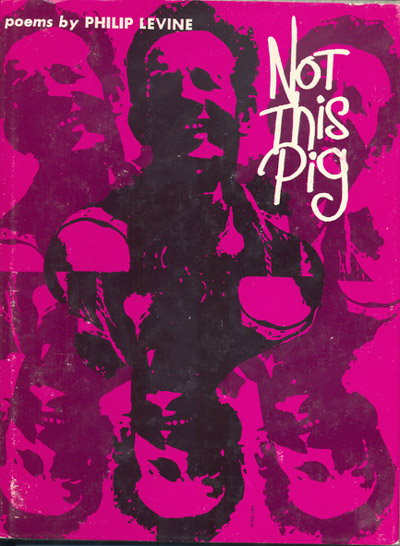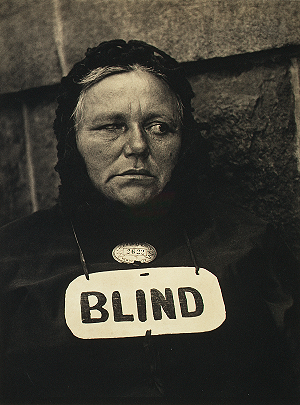delicious.com/willis.creative/blindfla links for the week ending today.
George Tooker. The Subway. 1950. Egg tempera on composition board. [Source: Whitney Museum of American Ar/NPR]- The Art Of Anxiety: Painter George Tooker Dies At 90 : NPR 040211
- Artist George Tooker, who was awarded the National Medal of the Arts in 2007, died of kidney failure at his home in Hartland, Vt., last Sunday. He was 90 years old. Tooker used luminous colors and light to illustrate how people should act toward one another — and painted the consequences of what happens when they don’t. In 1946, near the start of his career, Tooker painted Children and Spastics. The work shows a group of boys menacing a trio of gay men. It’s “one of the cruelest paintings” Tooker made, says art historian Robert Cozzolino. The artist was commenting on “things that he had witnessed or what he had felt people were capable of.” Tooker channels Michaelango’s The Torment of Saint Anthony with a Renaissance technique that comes in part from using egg tempera paints — a painstaking technique favored by the early masters.
- ‘Eagle Cam’ Soars With Millions : The Two-Way : NPR 040511
- A pair of bald eagles and their two (soon to be three) offspring who live atop a tree in Decorah, Iowa, have been watched in recent weeks by about 11 million people thanks to a webcam set up by the Raptor Resource Project, a nonprofit organization that works to restore and protect the Midwest’s population of falcons, eagles, ospreys, hawks and owls.
- Computer Translator Reads Between The Tweets : NPR 040511
- There are already computer programs to translate text from one language to another. But languages like Arabic or Urdu are tough — the script and the grammar are hugely different from European languages, and digitized dictionaries and grammatical algorithms for those languages are still in the early stages. These languages are politically important. Urdu, for example, is the language of Pakistan and of many Muslims in India. It’s a mix of Hindi and Persian and uses Arabic script.
- Backstory Of A Revolution: Studying Tweets, Posts : NPR 040511
- Steve Inskeep talks to Mazen Nahawi about how the Arab world has used social media forums to trigger social uprisings. Nahawi is president of News Group International, a Dubai-based news management company that monitors and analyzes traditional and social media around the Middle East and North Africa.
- Economics A-Z | Economist.com
- Opportunity cost: The true cost of something is what you give up to get it. This includes not only the money spent in buying (or doing) the something, but also the economic benefits (UTILITY) that you did without because you bought (or did) that particular something and thus can no longer buy (or do) something else. For example, the opportunity cost of choosing to train as a lawyer is not merely the tuition fees, PRICE of books, and so on, but also the fact that you are no longer able to spend your time holding down a salaried job or developing your skills as a footballer. These lost opportunities may represent a significant loss of utility. Going for a walk may appear to cost nothing, until you consider the opportunity forgone to use that time earning money. Everything you do has an opportunity cost. ECONOMICS is primarily about the efficient use of scarce resources, and the notion of opportunity cost plays a crucial part in ensuring that resources are indeed being used efficiently.
- Seeking a diplomatic solution - Inside Story - Al Jazeera English
- On Sunday, Abdel Ati al-Obeidi, Libya’s deputy foreign minister, landed in Athens, carrying a message from Gaddafi to the Greek prime minister. This was followed by a trip to Turkey and then Malta. The Greek foreign minister said his country wants to reinforce the demands of the UN resolution, while Franco Frattini, Italy’s foreign minister, dismissed al-Obeidi’s message from Gaddafi as “not credible” and reiterated that Gaddafi had to leave power. At the same time, Italy recognised the Libyan Opposition National Council as the only legitimate authority in the country. But the Libyan opposition is still refusing any kind of settlement, saying they will accept a UN-demanded ceasefire only if Gaddafi pulls his forces out from all Libyan cities. Inside Story, with presenter Dareen Abughaida, discusses with guests: Ashur Shamis, a Libyan journalist and writer; Dimitris Papadimitriou, a reader in European Politics at the University of Manchester; and Claire Spencer, Chatham House.
- Esquire Magazine Food Critic John Mariani — How ‘Italian Food’ Became A Global Sensation : NPR 032411
- Twenty years ago, Italian food was regarded as cheap, peasant food. Now it’s served on menus worldwide and considered to be one of the healthiest cuisines. Esquire Magazine’s food critic John Mariani chronicles the story of pizza, macaroni and red sauce in How Italian Food Conquered the World.
- The Future Of Nuclear Energy In The U.S. : NPR 033111
- Before the Fukushima disaster, nuclear power was being rebranded as a green form of energy. New York Times energy reporter Matt Wald explains how the situation in Japan is now raising questions about the safety and disposal of nuclear waste in the U.S.
- BBC - Podcasts - Peter Day’s World of Business 040211
- Peter Day has his ‘thinking hat’ on for this edition when he hears from two academics from the Rotman School of Management in Toronto, Canada. Producer: Richard Berenger Editor: Stephen Chilcott
- BBC - BBC World Service Programmes - The Strand, 02/04/2023
- German director Werner Herzog discusses his documentary - Cave of Forgotten Dreams - about the oldest known pictorial creations of humankind . Shot in 3D it has been hailed as his best film to date.
- BBC - BBC World Service Programmes - The Strand, 25/03/2011, Dirt
- Can you really turn dirt into art? We’ll be finding out at a new exhibition that features human faeces and other rather nasty realities of everyday life. ‘Dirt’ travels across centuries and continents to explore our complex relationship with this filthy phenomenon.
- BBC - BBC World Service Programmes - The Strand, 25/03/2011, Jennifer Egan
- Author Jennifer Egan: Her novel A Visit From The Goon Squad has just won a major literary award in the US and the author considers that it is just the latest product of her obsession with technology and whether by changing the nature of time it is essentially changing us too.
- The Cobra That Boggled New York’s State Of Mind : NPR 040211
- Scott Simon: “The Bronx Zoo cobra is back in the house. The 2-foot-long Egyptian cobra that disappeared from its cage in the reptile house of the Bronx Zoo last week was discovered on Thursday coiled in a cool, dark corner. Zoo officials said she is in good condition and had “no obvious bulges.” So despite all the comic fancies many of us had of the uncaged young cobra snacking on big salted pretzels and cheese blintzes, the snake apparently ate nothing for days. Snakes do that. It never left the reptile house, much less the Bronx. But for a few days, in a busy world, it was fun to imagine where a footloose young cobra might have slithered all over New York.”
- Obama’s Libya Doctrine Vague Amid False Choices : NPR 040211
- One of President Obama’s favorite rhetorical devices is to establish the false choices on policy, laying out extreme positions on both the left and the right and placing himself at the sensible center. In his Libya address, he again used the device to explain the policy’s complexities. Finding the “Obama Doctrine” political analysts are looking for is proving difficult.
- Ella Leya: American Jazz By Way Of Azerbaijan : NPR 040211
- Born in Azerbaijan, Leya was a Muslim girl who loved jazz and married a high-ranking Soviet army officer. Now in the U.S., she pays tribute to the complex women who inspire her on her new album, The Secret Lives of Women.
- In the City of the Immortals | Flickr - Photo Sharing!
- “Painted on my iPhone 4 using Camera, PhotoStudio, SketchBookMobile; shot on my iPhone in Recoleta Cemetary in Buenos Aires, and inspired by Jorge Luis Borges’ story ‘The Immortal’ that I was reading while I was there. I saw a pic of Borges in Paris, blindflaneur.com/?p=3062, while I was in BA at the Xul Solar museum, and just had to finish this…”
- On The Media: Transcript of “SLAPP Back” (April 1, 2023)
- A SLAPP, or “strategic lawsuit against public participation,” is a little known but widespread threat to the First Amendment. SLAPPs are meritless suits brought by companies, individuals and sometimes the government, not to win, but to silence critics. Congress is now considering federal anti-SLAPP legislation. In this piece that first aired last year, OTM producer Nazanin Rafsanjani looks into SLAPPs.
- On The Media: Transcript of “A First Amendment Round-Up” (April 1, 2023)
- The Supreme Court’s decision in the Citizens United case has sparked much controversy but New York Times Supreme Court correspondent Adam Liptak says the decision fits neatly into this Court’s broad interpretation of protected speech under the First Amendment. Liptak discusses some recent First Amendment cases and what’s up next for the court.
- On The Media: Transcript of “FOIA As a Political Tool” (April 1, 2023)
- Living on Earth: Monsters, Manipulation, and the Message from Nuclear Films
![gustave_caillebotte_paris_street_rainy_day Gustave Caillebotte. Paris Street, Rainy Day (La Place de l’Europe, temps de pluie). 1877. Oil on canvas. Art Institute of Chicago. [Source: Wikimedia Commons]](../../../../wp-content/uploads/2009/02/gustave_caillebotte_paris_street_rainy_day_1877_wiki.jpg)
![Fog at Isle Royale [Source: wildmengoneborneo.com] Fog at Isle Royale [Source: wildmengoneborneo.com]](../../../../wp-content/uploads/2008/04/isle_royale_fog.jpg)
 If there is an emerging genetic underclass, I could run for class president or class clown. Read more in
If there is an emerging genetic underclass, I could run for class president or class clown. Read more in 
